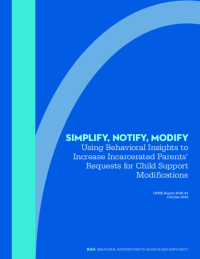Simplify, Notify, Modify
Using Behavioral Insights to Increase Incarcerated Parents’ Requests for Child Support Modifications

The Behavioral Interventions to Advance Self-Sufficiency (BIAS) project is the first major opportunity to use a behavioral economics lens to examine programs that serve poor and vulnerable families in the United States. Sponsored by the Office of Planning, Research and Evaluation of the Administration for Children and Families in the U.S. Department of Health and Human Services, and led by MDRC, the project applies behavioral insights to issues related to the operations, implementation, and efficacy of social service programs and policies. The goal is to learn how tools from behavioral science can be used to deliver programs more effectively and, ultimately, improve the well-being of low-income children, adults, and families.
This report presents findings from a behavioral intervention, developed in collaboration with the Washington State Division of Child Support (DCS), to increase the number of incarcerated noncustodial parents in Washington who apply for modifications to reduce the amount of their child support orders. Incarcerated noncustodial parents have a limited ability to pay their child support orders each month, due to their incarceration, which can lead to the accumulation of significant child support debt.
The BIAS project diagnosed bottlenecks in the process for applying for modifications, hypothesized behavioral reasons for the bottlenecks, and designed a sequence of behaviorally informed materials to be sent to incarcerated noncustodial parents. These materials provided incarcerated parents with a series of supports at different points in time to make them aware that they may be eligible for an order modification and to move them from intention to action. The materials included all the paperwork needed to request a modification, a tip sheet providing clear and succinct guidance on how to fill out the modification request, and reminders through electronic messages.
The test focused on 827 noncustodial parents who were incarcerated in Washington State prisons and were randomly assigned to one of two groups — the BIAS group or a control group. The BIAS group received the intervention materials, and the control group experienced DCS’s typical approach to interaction with incarcerated parents, which consisted of ad hoc outreach and written materials sent to parents who requested them. The intervention increased the percentage of parents requesting a modification from 9 to 41 percent, a 32 percentage point increase. Additionally, the intervention resulted in a 16 percentage point increase in the number of incarcerated parents actually receiving a modification to their child support orders.
The statistically significant impact on requests for modifications echoes the results of a prior BIAS test in Texas, which also found impacts on modification requests. Furthermore, it builds on these results by demonstrating that behaviorally informed messaging can also increase the percentage of parents who actually receive modifications to their child support orders. Finally, the intervention demonstrates the possible value of electronic messages as a tool for government agencies seeking to communicate with incarcerated populations.







